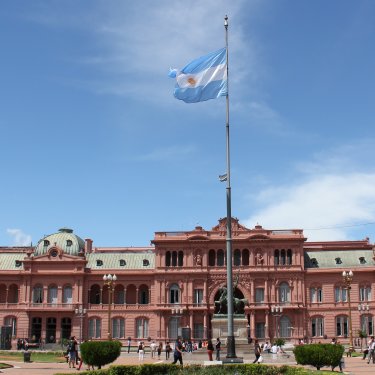Argentina’s presidential election: RSF’s ten proposals for media freedom and independence

With just days to go to the first round in Argentina’s presidential election, Reporters Without Borders (RSF) calls on the five candidates to adopt its ten proposals for reinforcing media freedom and consolidating journalistic independence in Argentina.
Argentina, which will celebrate 40 years of uninterrupted democracy in December, is preparing to elect a new president. While the past four decades have established solid free speech standards, the next president will need to prioritise the defence and promotion of journalistic independence, media pluralism and reliable news reporting.
RSF urges the five presidential candidates to incorporate its ten proposals into their electoral manifestos in order to achieve six crucial objectives: access to public and pluralistic information; protection of journalists covering protests; editorial autonomy within the public media; prevention of further media concentration; editorial independence in the media as a whole; and regulation of online platforms.
Media freedom and journalistic independence have an absolutely central role to play in consolidating democracy in Argentina. A new government committed to these goals will have the opportunity to place Argentina at the regional forefront of the right to news and information. There are still many challenges, but there are also real possibilities for advancing pluralism, the regulation of the digital arena and access to information. RSF will submit its recommendations to the presidential candidates.
RSF’s ten proposals for journalistic freedom and independence and reliable news and information:
Defence of press freedom
1. As a pillar of democracy, Argentina's future president must commit to fully defending press freedom. Under legislation already in effect, the president must not resort to vilification of the media or to administrative or criminal judicial proceedings in retaliation for reporting or opinions published in the media. Freedom of expression and a right of response in the media are guaranteed to all of Argentina’s inhabitants, including government officials, in a framework of democratic coexistence.
2. As regards Argentina's regions, the national government must have an ambitious policy so that press freedom is not undermined by local political authorities or local private sector interests. No provincial procedure or legislation should weaken the nation's constitutional safeguards protecting press freedom.
Access to state-held and diverse information
3. The state must respect and must ensure respect for the law on access to state-held information and news coverage in state entities and the public arena.
4. Under no circumstances should the police be used to restrict or intimidate the media, or engage in physical attacks on journalists under the pretext of suppressing riots or dispersing protests.
5. The media must be accessible to the entire population, without economic or geographic exclusion. It is the state’s duty to ensure that all citizens have access to the Internet and telecommunications that meets technologically acceptable standards.
6. Public media must fulfil their role as guarantors of free speech and the right to news and information insofar as they are intended to be non-governmental in nature. Political, social, geographical and economic diversity, and independence – including financial independence – from the state are essential conditions for public media.
Democratic regulation
7. The government must ensure the news is reported in a pluralistic manner and must promote regulation that encourages media diversity, in order to avoid private sector or state media monopolies.
8. Regulatory bodies must be independent, with diverse representation in terms of political, social, geographic and economic identities.
Democracy in the digital arena
9. As Argentina is a member of the Partnership for Information and Democracy, the future government will have to propose legislation that adapts the regulations applying to the news media and communication to the situation created by the new globalised digital environment and, in particular, defines the responsibilities of the leading online platforms.
10. The state must ensure that online social media do not engage in censorship under the guise of content moderation, marketing or sale of space. The regulation of a truly diverse digital ecosystem should not be left to global private sector corporations.
11. The government must develop digital education policies, policies for combatting violence and disinformation, and accountability policies in order to combat the mechanisms used to harass journalists on social media.
